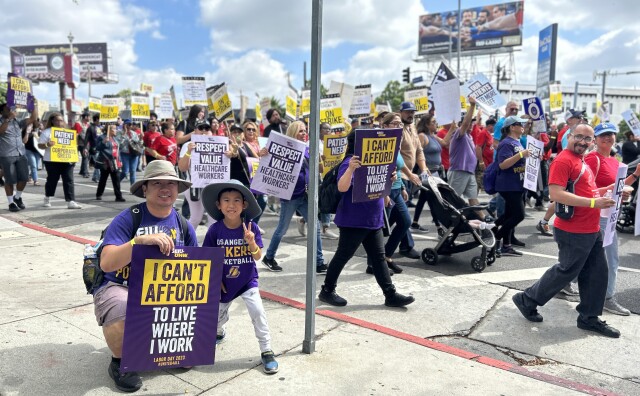For the last couple decades, heart researchers have been following hundreds of older Chinese American immigrants in Los Angeles and Chicago as part of a study looking at the connection between immigration and cardiovascular disease.
As the years have ticked by, some participants, whose average age was 62 at the start of the study, have fallen ill from heart disease, others have died. And trends have emerged.
The longer immigrants lived in the U.S., their cardiovascular risks went up. And where they lived in the U.S. also appeared to be a factor.
Immigrants who settled in Los Angeles had a higher death rate from heart disease than the cohort in Chicago.
“That’s a big surprise,” said the study’s lead author Dr. Xinjiang Cai, a cardiologist at UCLA.
Cai had surmised Angelenos would be more physically active — an important aspect of heart health: “L.A. has beautiful weather compared to Chicago.”
But the immigrants in L.A. reported exercising less than the Chicagoans.
Aside from working out more, those in the Windy City also had higher levels of educational attainment, which is associated with better socioeconomic and health outcomes.
Get early intervention
Cai says more investigation is needed to explain the geographic disparities found in the study, published this month by the Journal American Heart Association.
But the findings about physical activity have him doubling down on his mantra: Work out at least 30 minutes, five times a week. And if you can’t quite get there?
“Any exercise during the week is better than no exercise,” Cai said.
Cai said that other key interventions can reduce your risk of heart disease:
- Eat healthier
- Quit smoking
- Reduce your stress levels
- Get enough sleep
- Manage your weight
- Control your cholesterol level, especially the bad kind LDL
- Manage your blood sugar level
- Keep your blood pressure in the realm of normal
- And pay attention to potential symptoms of heart problems, such as chest pain, shortness of breath, difficulty breathing, dizziness and palpitations
Cultural hurdles
Cai said to ensure immigrants get appropriate heart care, clinicians have to bridge linguistic and cultural barriers.
Cai describes relief washing over the faces of Chinese immigrant patients when they see him.
“They say ‘Oh, doctor, I'm so happy to see you because you can speak Mandarin,” Cai said.
Cai also recognizes that some patients may also rely on a combination of Western and Eastern medicine, which may include taking Chinese herbs. And he knows the Chinese diet is high in carbohydrates because rice and noodles are major staples. He recommends those at risk of heart disease to alter their palate.
“Normally we’d recommend a patient to eat a Mediterranean diet because that tends to be healthier,” Cai said.
What’s next
Of the original 746 participants, 560 are still alive and active in the continuing study which involves going to exams and taking part in interviews.
Cai said that Asian Americans are such a heterogeneous population that the results from the study of the Chinese immigrants can only be extrapolated so much to other ethnic groups. He noted that South Asians tend to have higher risk of cardiovascular disease among Asian Americans.
“So genetic background definitely plays a very key role here,” Cai said. “And you still have to pay attention to environmental factors.”
Historically, Asian Americans have been underrepresented in clinical studies and trials. That is starting to change with this year’s launch of the first long-term cancer study for Asian Americans. In Southern California, Cedars-Sinai and UC Irvine’s cancer center are currently recruiting participants.










